Regenerative Medicine News and General Information
Scientists Discover Links Between Alzheimer’s Disease and Gut Microbiota
Researchers have discovered the link between the gut microbiota and Alzheimer’s disease. For the first time, researchers have found that Alzheimer’s symptoms can be transferred to a healthy young organism via the gut microbiota, confirming its role in the disease.
The study supports the emergence of the gut microbiome as a key target for investigation in Alzheimer’s disease due to its particular susceptibility to lifestyle and environmental influences.
Published in Brain, the study shows that that the memory impairments in people with Alzheimer’s could be transferred to young animals through transplant of gut microbiota.
Alzheimer’s patients had a higher abundance of inflammation-promoting bacteria in faecal samples, and these changes were directly associated with their cognitive status.
Professor Yvonne Nolan said: “The memory tests we investigated rely on the growth of new nerve cells in the hippocampus region of the brain. We saw that animals with gut bacteria from people with Alzheimer’s produced fewer new nerve cells and had impaired memory.”
“People with Alzheimer’s are typically diagnosed at or after the onset of cognitive symptoms, which may be too late, at least for current therapeutic approaches. Understanding the role of gut microbes during prodromal — or early stage- dementia, before the potential onset of symptoms may open avenues for new therapy development, or even individualised intervention,” said Professor Nolan.
Alzheimer’s is the most common cause of dementia, a general term for memory loss and other cognitive abilities serious enough to interfere with daily life. As our population ages, one in three people born today are likely to develop Alzheimer’s. Funded by Science Foundation Ireland, scientists in UCC are working to develop strategies to promote healthy brain ageing and advance treatments for Alzheimer’s by exploring how the gut microbiota respond to lifestyle influences like diet and exercise.
Sources:
Stefanie Grabrucker, Moira Marizzoni, Edina Silajdžić, Nicola Lopizzo, Elisa Mombelli, Sarah Nicolas, Sebastian Dohm-Hansen, Catia Scassellati, Davide Vito Moretti, Melissa Rosa, Karina Hoffmann, John F Cryan, Olivia F O’Leary, Jane A English, Aonghus Lavelle, Cora O’Neill, Sandrine Thuret, Annamaria Cattaneo, Yvonne M Nolan. Microbiota from Alzheimer’s patients induce deficits in cognition and hippocampal neurogenesis. Brain, 2023; DOI: 10.1093/brain/awad303
University College Cork. (2023, October 17). Scientists discover links between Alzheimer’s disease and gut microbiota. ScienceDaily. Retrieved October 18, 2023 from www.sciencedaily.com/releases/2023/10/231017215922.htm
Photo by Pixabay from Pexels: https://www.pexels.com/photo/close-up-of-microscope-256262/

